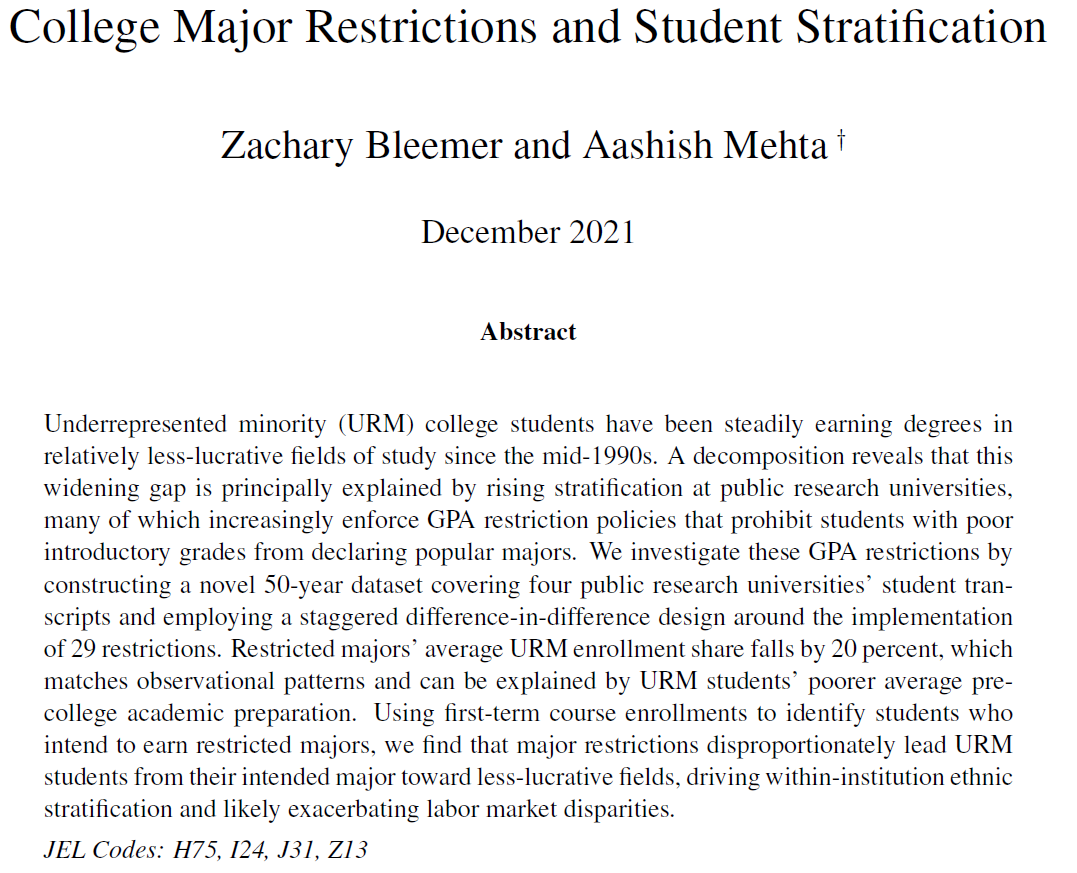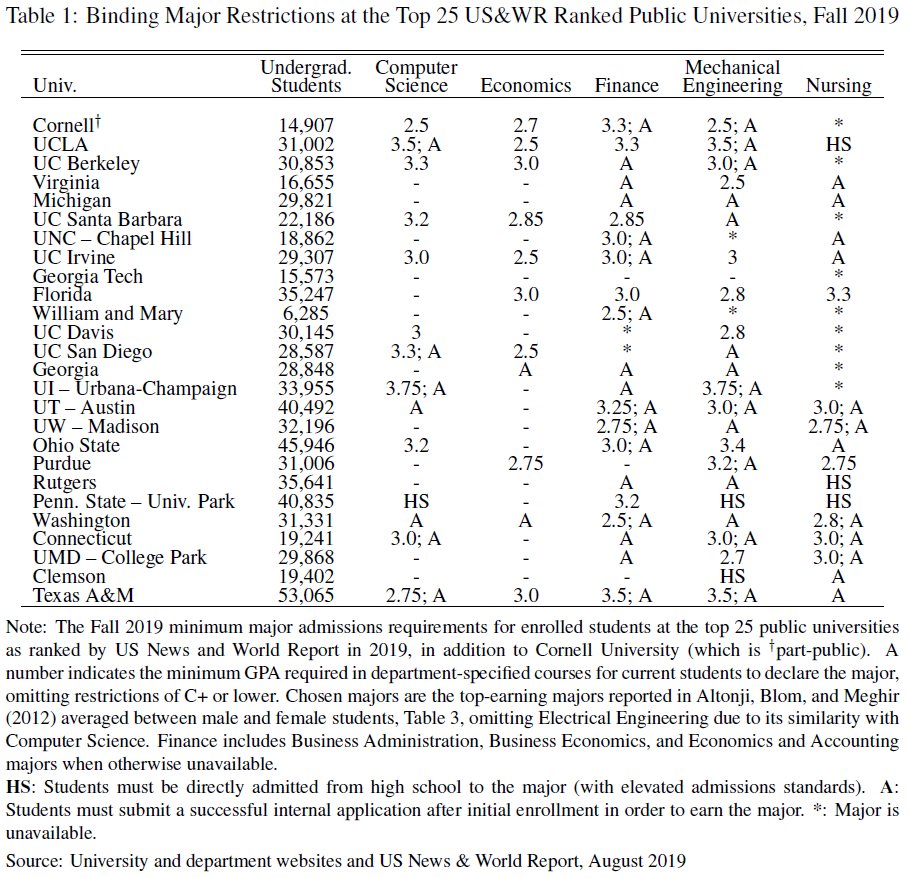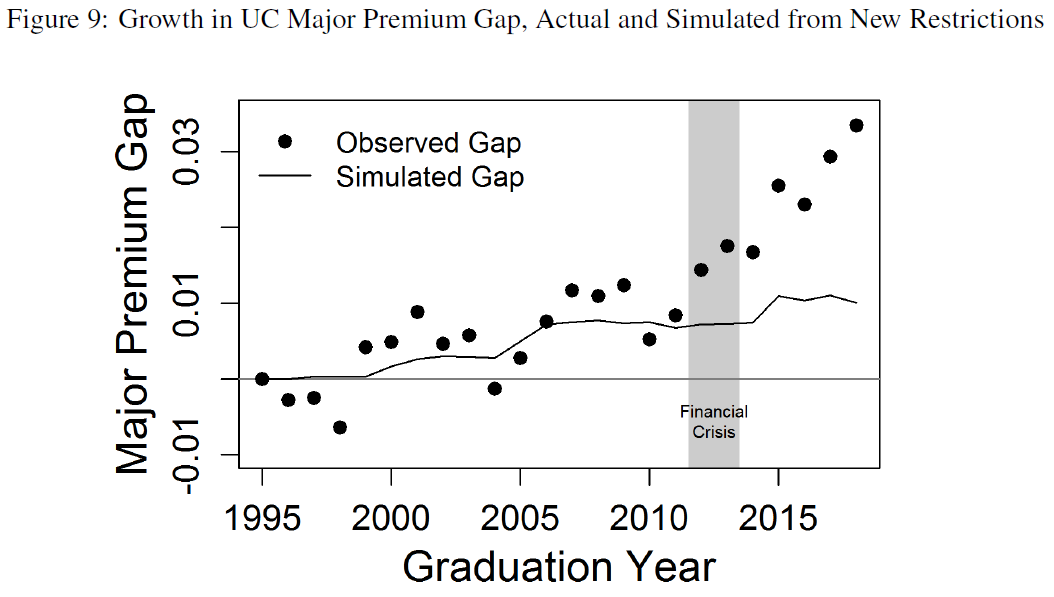
**New paper** Over the past 20 years (but not before!), Black and Hispanic college graduates have been steadily earning degrees in relatively lower-paying majors.
The main culprit? An increasingly-common public university policy.
A thread. #EconTwitter zacharybleemer.com/wp-content/upl…
The main culprit? An increasingly-common public university policy.
A thread. #EconTwitter zacharybleemer.com/wp-content/upl…

Underrepresented minority (URM) college graduates have long earned lower-paying majors than their non-URM peers, but the gap has been growing for the past 20 years.
Today, URM graduates earn degrees with lower average wages by almost 3%. 2/n
Today, URM graduates earn degrees with lower average wages by almost 3%. 2/n

We decompose that widening gap and find that 2/3 can be explained by increased stratification WITHIN universities. URM students' shift toward for-profits matters, but not as much as growing stratification at the schools where they were already enrolling. 3/n 

Stratification has been growing everywhere, but especially at public research universities. So we took a closer look at those schools. 4/n 

Many people like to think of college majors as a free CHOICE made by students. We did too! But it turns out that many public universities increasingly restrict access to popular majors using GPA restrictions and competitive applications. 5/n 

For example, if you want to be an economics major at @UF or @UCBerkeley, you need to earn a B average in your introductory economics courses. If you don't, you'll have to study something else instead. 6/n
Majors with GPA restrictions tend to have fewer URM students, even compared to those same majors at other schools without restrictions. But do major restrictions have a differential CAUSAL effect on URM students? 7/n 

There's good reason to expect a causal relationship: URM students earn lower average grades in first-year courses. Many were admitted for their academic promise despite having had more limited academic opportunity. They could catch up, but often don't get the chance. 8/n 

We study the effects of major restrictions by constructing a new detailed database that covers the 900,000 students who enrolled at four public research universities between 1975 and 2018. 9/n
A staggered difference-in-difference design around 29 major restrictions' implementation shows that GPA restrictions cause an immediate 3 percentage point (20 percent) decline in URM attainment.
[Econometric note: Sun/Abraham estimates look the same] 10/n
[Econometric note: Sun/Abraham estimates look the same] 10/n

In other words, GPA restrictions boot out students with lower academic preparation. Even targeted major restrictions actually sort students based on ABSOLUTE, not comparative, academic advantage. 11/n 

We then introduce a methodological innovation -- using student major INTENTIONS (predicted using pre-policy data) as the second difference in a diff-in-diff -- to show that restrictions differentially push URM students into lower-paying majors. 12/n 

Finally, we use our estimates to simulate how much of the URM major premium gap can be explained just by new restrictions. It does a good job until recent years, when we think older restrictions' tightening (like going from 3.0 to 3.3) played a bigger role. 13/n 

BONUS: Think that major restrictions may be in students' best interest, keeping them out of fields they're unprepared for?
Our forthcoming paper in AEJ: Applied shows otherwise: RD evidence shows massive long-run costs to being booted out. aeaweb.org/articles?id=10… 14/n
Our forthcoming paper in AEJ: Applied shows otherwise: RD evidence shows massive long-run costs to being booted out. aeaweb.org/articles?id=10… 14/n

The paper has a bunch of other findings as well, including major restrictions' effects on the gender gap in major premiums and their disaggregated effects on Asian, Black, and Hispanic students. 15/n
Bottom line: GPA-based major restriction policies exacerbate educational equity gaps between high- and low-SES families, with negative implications for efficiency, economic mobility, and the ethnicity wage gap. Here's the full paper: zacharybleemer.com/wp-content/upl… 16/n
Thanks for reading!
And my coauthor @ProfAMehta and I owe big thank-yous to @BerkeleyCSHE, @Spencer_Fdn, @OppInsights, and @UCHRInews for supporting this project! 17/n
And my coauthor @ProfAMehta and I owe big thank-yous to @BerkeleyCSHE, @Spencer_Fdn, @OppInsights, and @UCHRInews for supporting this project! 17/n
• • •
Missing some Tweet in this thread? You can try to
force a refresh





